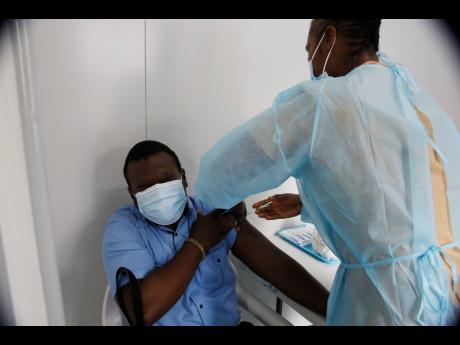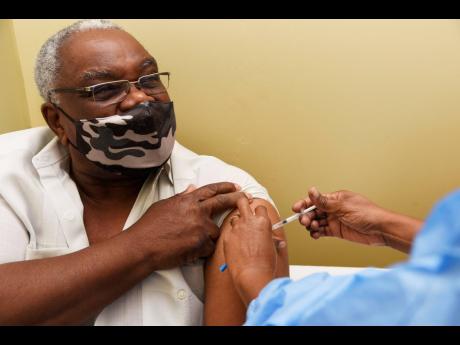‘I did it out of love’
Concern for vulnerable relatives influencing vaccine take-up despite scepticism
A year after the World Health Organization declared the COVID-19 outbreak a pandemic, as it sent lives and economies into free fall, videos of elderly relatives crying on the shoulders of their children and grandchildren in the Unites States have begun to emerge after months in isolation.
Vaccination drives have been ushering in a new wave of hope for an end to the pandemic. And for many, including the elderly, the jab marks the beginning of the road to freedom, as Professor Denise Eldemire-Shearer noted when she took the first COVID-19 shot administered by the health authorities locally last Wednesday.
The AzstraZeneca jabs which arrived in the island last Monday and are currently being administered are from a gift of 50,000 doses from the Indian government. Tomorrow, an additional 14,400 doses are expected to land here, the first tranche of vaccines secured by the Government under the COVAX Facility.
The island’s healthcare workers, security forces and elderly comprise priority groups currently being inoculated, and many are expressing joy and relief on receiving the first of the two-dose vaccine despite some scepticism.
Clarendon pharmacist Chad Clarke told The Sunday Gleaner that he took the vaccine out of love for family. In an interview Friday, two days after receiving his first jab, and suffering slight fever, headache and tiredness, he noted that the nature of his job could put him at increased risk of exposure or transmission.
“Many persons don’t consider pharmacists front-line workers, but just think about it. An infected pharmacist can infect everyone with whom he interacts, plus the other pharmacists,” he said, adding that the decision to take the vaccine would be “highly personal”.
QUESTIONS AND CONCERNS
He continued: “Even among medical experts like myself, there are questions, and even though you understand how much technology has been advanced, there are concerns as some answers don’t sit well with you,” Clarke said.
One concern is that the current available vaccines from various manufacturers have up to 95 per cent efficacy, not the 100 per cent some vaccines taken in the past had.
“But if I don’t take it, what I do for a living will put my family at risk. I live with my parents and they are at a particular age, and I wonder if they get sick what will happen to them, given what is happening in the hospitals. So I rather take the vaccine and lower the risk of my family members and my loved one getting ill. So yes, I did it out of love,” the pharmacist said Friday.
“We are quasi front-line workers and I see about a 1,000 persons per week. And if 30 per cent of the population is likely to get it, it means that one-third (333) of the persons I see weekly can infect me, but I can infect all 1,000. So my colleagues and I think it is very important that doctors, nurses, pharmacists and other workers who interface with large groups must be at the front of the line to get vaccinated,” Clarke argued.
Turning to concerns others have had about side effects, he said that all medicines carried side effects, which is why doctors ask patients if they have any known reactions to injection, for example.
“Some have been impacted less serious than others, but we are in a space that can quickly cause it (virus) to spread because we see the diabetics, those with hypertension and other comorbidities,” Clarke stated.
Professor Michael Boyne, the head of the Department of Medicine at the University Hospital of the West Indies (UHWI), was among several health professionals from the UHWI, the leading institution in the local response to COVID-19, who spoke with The Sunday Gleaner early in the local outbreak about their assessment of trends and emerging concerns arising from the cases.
Last Wednesday, March 10, on the anniversary of the first case recorded locally, he saluted God and medicine in a Facebook post as he took the vaccine, urging others to do the same.
“Today is the (one) 1-year anniversary, so I selected a special tie to wear. The tie reflects my belief that God uses the principles of science to give us the world we live in. And only one year later, we have an amazing miracle of highly efficacious vaccines to give us light in a dark world. I received the call to get the vaccine today and I was thankful. So, on this 3/10 anniversary, I salute the Almighty, the innovative scientists, the gift from the Indian government, and every healthcare worker putting themselves at risk, working their butt off to help those in distress,” said Boyne.
“So, if you are offered the vaccine, please take it. The life you save may not be your own, but maybe your family members and your friends,” he concluded.
Corporate Area high school teacher Ren H said that she was afraid of vaccines, but would be open to take the one-dose Johnson & Johnson jab and not the AstraZeneca shots “based on the fact that it was rejected by some other countries, and my friend who is a doctor in the USA said that it has a lot more than side effects than the Johnson & Johnson vaccine”.
She did not subscribe to the notion of biblical fulfilment, although noting that among the factors driving vaccine hesitancy among her friends are arguments about Bible prophesies and anti-vaccine messaging from pastors.
The pastors’ edict has caused a strain on the family of a 23-year-old University of the West Indies student, who did not wish to be named.
Raised in the church by devout Christians, he said that he was disappointed with his church’s message.
“It amazes me how persons take a 50-50 chance and tell a doctor, who going to do surgery on your mother or father, to go ahead and do a surgery. Nobody asks what medicines the doctor going to use – well, except Jehovah’s Witnesses, and that is a maybe. They just say, ‘I want my mommy or daddy alive’,” noted the student.
“My church pastor telling everybody that blood coverage is all they need. Nuff people in a dah same church deh go a hospital fi other sickness,” said the 23-year-old.
“My parents raised me and my three sisters in the church. And that is where I learnt that Jesus’ disciple, Luke, was a doctor. If Jesus Himself find use for a doctor among His disciples, it means the spiritual and medical go together,” said the student with much annoyance.
Not every church is raining brimstones and fire on vaccines.
In a brief response last week, Pastor Everett Brown, who heads the Seventh-day Adventist Church in Jamaica, told The Sunday Gleaner: “It is an individual decision, but the church believes in the overall effectiveness of vaccine and vaccination.”
Pastor Steven Hayle heads the St James branch of the Church of Pentecost mission in Jamaica with headquarters in Ghana. Its head, Apostle Eric Nyamekye, and other apostles have already taken the jab in that African country.
“There has been discussion on the matter among the church’s leadership and especially given the number of things going around about 666 and the mark of the beast. So the church looked at it from the religious and scientific perspectives, and from both areas, they concluded that scientifically, the vaccine is good to be used,” Hayle told The Sunday Gleaner on Friday.
One retired politician made the point to this newspaper last week that the Church and politics were closely aligned.
“We beg people for their votes and make promises, some of which we have kept, and others we are unable to do for a number of reasons,” he said.
“If there was a vaccine for cancer, the whole world would take it and it would not be Satanic or part of One World order. If there was a vaccine for cancer, diabetes, hypertension or Ebola, the people in the countries in Africa devastated by the deaths of thousands would take it. If there was vaccine against wars, people would take it because the world wants peace. So this poison from the pulpit is senseless,” he said, pushing back at pastors with anti-vaccine messages.
“It’s the older persons who have been mostly affected by this vaccine. Let us see how the churches and families are going to make it out when families say their aged parents must take the vaccine and pastors tell them otherwise,” he added, noting that the most faithful in the churches were older than 50 years and largely in the high-risk group.


